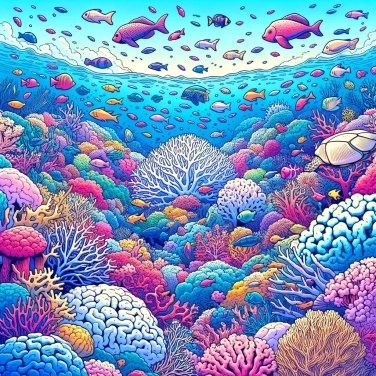Coral reefs are important for marine biodiversity because they host a wide variety of marine species, provide essential habitats for many fish and other organisms, and help maintain the ecological balance of marine ecosystems.

Coral reefs are one of the richest and most diverse marine environments in the world. True underwater cities, they are home to nearly a quarter of known marine species, despite their relatively small area. Turtles, colorful fish, crustaceans, mollusks, all find refuge in these living labyrinths. Every nook brims with life thanks to the numerous shelters and hiding spots provided by the coral. Without these reefs, a multitude of species would simply have no place to live or feed, directly threatening their survival.
Coral reefs provide a true natural shelter ideal for thousands of marine species. These ecosystems offer crucial hiding spots where fish, crustaceans, and many other aquatic creatures can grow peacefully, safe from predators. It's somewhat their underwater nursery where young species can develop safely before venturing out to explore the ocean in turn. Without these reefs, many of them would struggle to survive, and the impressive variety of marine life would be seriously threatened.
Coral reefs are like the lungs of the ocean: they actively absorb CO2 and release oxygen, helping to maintain healthy water ideal for marine species. They also play a major role in breaking waves, reducing their energy and protecting coastlines from erosion. Without them, many islands and beaches would be ravaged by storms. With their complex network, they directly contribute to the recycling of nutrients by allowing good circulation of nitrogen and phosphorus for all aquatic life around them. Basically, no reefs means it quickly becomes a mess underwater!
These reefs are a true crossroads of marine life. In a limited space, a multitude of species (corals, algae, fish, crustaceans, mollusks) coexist and interact continuously. For example, some small fish clean the skin of larger species by feeding on their parasites: everyone benefits, it’s a mutualistic relationship. Some interactions may seem bizarre, like the clownfish being protected by the anemone, while the same anemone kills other fish that might approach. Predators, for their part, regulate populations, preventing certain species from proliferating too much and disrupting the balance. In short, in these multiple and varied interactions, everyone gains an advantage or finds their place, and this complexity ensures the richness and stability of the marine ecosystem.
Corals act as a true natural marine filter: they actively capture nutrients present in the water, such as nitrogen and phosphorus. By absorbing these essential substances, they prevent them from accumulating too much in the water, thus limiting the proliferation of harmful or invasive algae. Less excessive algae means clearer water, better light penetration, and healthier marine environments where fish and other species can thrive peacefully. On the other hand, this balance helps preserve the overall quality of the water and stabilize the entire marine ecosystem. Without the reefs, we would quickly have a big aquatic mess.
When corals are stressed by rising water temperatures, they can undergo a phenomenon known as coral bleaching, losing their vibrant color and threatening the marine biodiversity they support.
Some corals can grow only a few millimeters per year, meaning that the reefs we see today may be thousands or even tens of thousands of years old.
Coral reefs naturally protect coastlines against erosion, destructive waves, and storms by absorbing up to 97% of wave energy.
Did you know that the Great Barrier Reef in Australia is visible from space? It is also designated as a UNESCO World Heritage site, recognized as one of the richest areas of biodiversity on Earth.
Coral reefs contribute to the economy through tourism by attracting divers and water sports enthusiasts, as well as to local artisanal fishing by serving as a natural breeding ground for many commercially valuable marine species.
Coral reefs play a protective role by absorbing and reducing the force of waves and currents during storms, hurricanes, or tsunamis, thereby protecting coastlines and coastal communities from erosion and flooding.
You can reduce your carbon footprint to limit global warming, adopt responsible fishing practices, avoid the use of harmful chemicals, choose a coral-friendly sunscreen, and support local campaigns for the preservation of marine ecosystems.
While the majority of known coral reefs are indeed found in tropical areas where the water is warm, there are also cold-water coral reefs, known as deep coral reefs, that exist in cold waters at great depths, hosting a rich marine biodiversity as well.
The main threats are coral bleaching caused by climate change, ocean acidification, overfishing, marine and terrestrial pollution, and direct destruction resulting from human activities such as coastal construction.

No one has answered this quiz yet, be the first!' :-)
Question 1/6